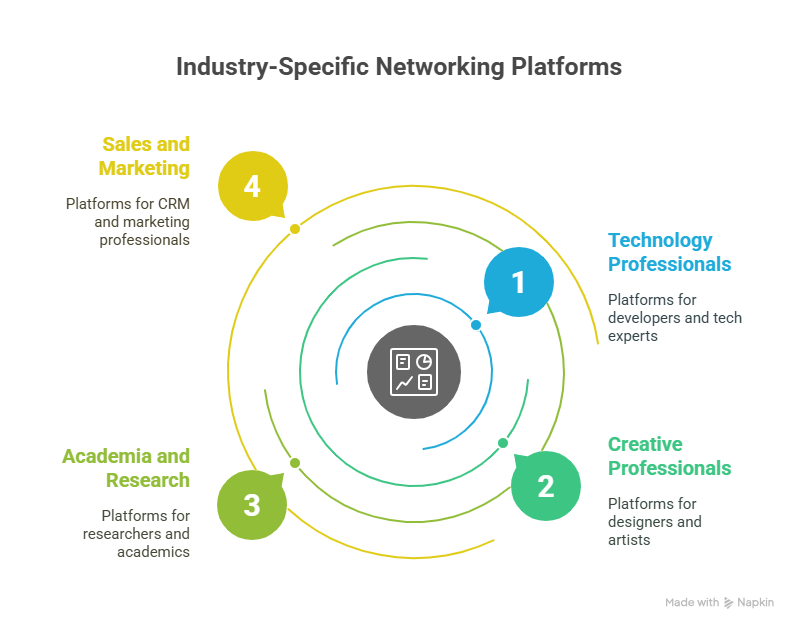Building a Professional Network: Why and How?
In today’s interconnected professional world, the old saying “it’s not what you know, but who you know” has evolved into “it’s what you know, who you know, and who knows what you know.” Professional networking has become one of the most powerful tools for career advancement, job discovery, and professional development. Yet, many professionals, especially those early in their careers, struggle with networking or view it as superficial relationship-building.
This comprehensive guide will demystify professional networking, showing you why it’s essential for career success and providing practical strategies to build meaningful professional relationships that will serve you throughout your career journey.
The Critical Importance of Networking in Your Job Search
The Hidden Job Market Reality
Research consistently shows that 70-80% of jobs are never publicly advertised. These positions, known as the “hidden job market,” are filled through internal referrals, networking connections, and recruitment agencies before they ever reach job boards. This means that relying solely on online applications significantly limits your access to available opportunities.
When you have a strong professional network, you gain early access to these hidden opportunities. Your connections can alert you to upcoming openings, provide insider information about company culture and hiring processes, and even recommend you directly to hiring managers.
The Power of Personal Recommendations
Hiring managers face the challenge of evaluating candidates based on limited information from resumes and brief interviews. A personal recommendation from a trusted colleague or industry contact carries significant weight in the decision-making process. When someone vouches for your skills, work ethic, and cultural fit, it dramatically increases your chances of getting hired.
Studies indicate that referred candidates are four times more likely to be hired than those who apply through traditional channels. Additionally, referred employees often experience faster onboarding, better job satisfaction, and longer tenure with their organizations.
Access to Industry Insights and Mentorship
A robust professional network provides invaluable access to industry knowledge, trends, and insights that you might not discover through formal channels. Experienced professionals in your network can serve as mentors, offering guidance on career decisions, skill development, and navigating workplace challenges.
These relationships often evolve into long-term mentorship opportunities that can accelerate your professional growth and help you avoid common career pitfalls.
Building Your Professional Brand and Reputation
Networking helps you establish and maintain your professional reputation within your industry. When you consistently engage with others in meaningful ways, share valuable insights, and demonstrate expertise, you build a personal brand that opens doors to new opportunities.
Your network becomes a channel for showcasing your achievements, expertise, and professional values, creating a positive reputation that precedes you in professional settings.
Mastering Online Networking Platforms
LinkedIn: Your Digital Professional Hub
LinkedIn has become the undisputed leader in professional networking, with over 800 million users worldwide. Maximizing your LinkedIn presence is essential for modern professional networking.
Optimizing Your LinkedIn Profile
Your LinkedIn profile serves as your digital business card and professional portfolio. Ensure your profile photo is professional and current – profiles with photos receive 21 times more profile views. Write a compelling headline that goes beyond your job title to showcase your unique value proposition.
Craft a summary that tells your professional story, highlighting your expertise, achievements, and career aspirations. Use industry-relevant keywords to improve your discoverability in searches. Keep your experience section detailed and achievement-focused, using quantifiable results whenever possible.
Strategic Connection Building
Don’t simply collect connections like trophies. Focus on building meaningful relationships with quality contacts. When sending connection requests, always include a personalized message explaining why you want to connect and how you might mutually benefit from the relationship.
Target connections strategically: colleagues, industry peers, alumni from your school, professionals you’ve met at events, and thought leaders in your field. Aim for a mix of peers at your level, senior professionals who can provide mentorship, and junior colleagues you can support.
Content Engagement and Sharing
Active participation on LinkedIn significantly increases your visibility and establishes you as an engaged professional. Share relevant industry articles with thoughtful commentary, write original posts about your professional experiences or insights, and engage meaningfully with others’ content through comments and shares.
Join LinkedIn groups related to your industry or interests. Participate in discussions, share valuable resources, and connect with active group members. This positions you as a knowledgeable and engaged professional within your field.
Industry-Specific Platforms and Communities
While LinkedIn dominates professional networking, don’t overlook industry-specific platforms that might be more relevant to your field.
Technology Professionals GitHub for developers to showcase code repositories, Stack Overflow for technical discussions, and AngelList for startup ecosystem networking.
Creative Professionals Behance for designers and artists, Dribbble for design inspiration and networking, and Stage 32 for entertainment industry professionals.
Academia and Research ResearchGate for researchers and academics, Academia.edu for scholarly networking, and ORCID for researcher identification and networking.
Sales and Marketing Salesforce Trailblazer Community for CRM professionals, HubSpot Community for inbound marketers, and various industry-specific forums and communities.
Virtual Networking Best Practices

Online networking requires different strategies than face-to-face interactions. Focus on providing value before asking for anything. Share useful resources, make introductions between your connections, and offer assistance when you can help.
Maintain consistent engagement rather than sporadic bursts of activity. Regular, thoughtful participation is more effective than intense but short-lived networking efforts.
Always follow up on online connections with meaningful conversations. If someone accepts your connection request, send a thank-you message and suggest ways you might collaborate or support each other professionally.
Tips for Effective Networking: Building Authentic Relationships
Authenticity Over Transactions
The most effective networking happens when you approach relationships authentically rather than transactionally. Focus on building genuine connections based on mutual interests, shared values, or common professional challenges rather than immediately seeking personal gain.
Show genuine interest in others’ work, challenges, and achievements. Ask thoughtful questions about their experiences and actively listen to their responses. This approach builds trust and creates the foundation for lasting professional relationships.
The Give-First Mentality
Successful networkers understand the importance of giving before receiving. Look for ways to help your connections: share relevant opportunities, make introductions, provide useful resources, or offer your expertise when appropriate.
This give-first approach creates goodwill and positions you as a valuable connection. When you eventually need assistance or opportunities, your network will be more willing to help because you’ve demonstrated your commitment to mutual support.
Quality Over Quantity
While it might be tempting to collect as many contacts as possible, focus on building deeper relationships with a smaller number of meaningful connections. A network of 100 strong relationships is far more valuable than 1,000 superficial contacts.
Invest time in nurturing your existing relationships. Regularly check in with your connections, congratulate them on achievements, and maintain ongoing conversations about industry trends and developments.
Follow-Up and Relationship Maintenance
Consistent follow-up is crucial for maintaining professional relationships. After meeting someone new, follow up within 48 hours with a personalized message referencing your conversation and suggesting ways to stay connected.
Create a system for staying in touch with your network. This might include quarterly check-in emails, sharing relevant articles, or commenting on their social media updates. Use CRM tools or simple spreadsheets to track your networking activities and ensure you’re maintaining regular contact.
Networking Etiquette and Professional Standards
Always maintain professional standards in your networking activities. Be respectful of others’ time, honor commitments, and maintain confidentiality when appropriate. If you promise to make an introduction or share information, follow through promptly.
Be gracious when others can’t help you and understanding when they’re too busy to engage. Professional networking is a long-term game, and maintaining positive relationships even when immediate benefits aren’t apparent is crucial for long-term success.
Leveraging Alumni Networks: Your Built-In Professional Community
The Alumni Advantage
Alumni networks represent one of the most underutilized networking resources available to professionals. Shared educational experiences create an immediate bond and common ground for professional relationships.
Alumni are often more willing to help fellow graduates because they understand the challenges of entering the workforce and appreciate the value of their shared educational experience. This creates opportunities for mentorship, job referrals, and industry insights that might not be available through other networking channels.
Connecting with Alumni Effectively
Start by utilizing your university’s alumni directory and LinkedIn’s alumni search feature. Search for alumni working in your target companies, industries, or geographic locations. When reaching out, mention your shared alma mater in the subject line and reference specific aspects of your shared experience.
Craft personalized messages that acknowledge your connection while clearly stating your purpose for reaching out. Whether you’re seeking informational interviews, industry advice, or job opportunities, be specific about what you’re looking for and how they might be able to help.
Alumni Events and Reunions
Attend alumni events, reunions, and university-sponsored networking gatherings. These events provide natural opportunities to connect with fellow graduates in relaxed, social settings where professional networking feels more organic.
Many universities host industry-specific alumni events or career panels where you can connect with graduates working in your field of interest. These targeted events often provide more relevant networking opportunities than general alumni gatherings.
Giving Back to Strengthen Alumni Connections
Consider volunteering with your university’s alumni association or career services office. Helping with events, mentoring current students, or participating in career panels positions you as an engaged alumnus and expands your network within the alumni community.
Many successful professionals remember those who helped them early in their careers and are more likely to support your professional endeavors when you’ve demonstrated commitment to helping others.
Maximizing Professional Events and Conferences
Pre-Event Preparation
Successful networking at professional events begins before you arrive at the venue. Research the attendee list, speaker lineup, and event agenda to identify key people you want to meet and sessions that align with your professional interests.
Set specific networking goals for each event. Rather than trying to meet everyone, focus on making 3-5 meaningful connections that could lead to ongoing professional relationships.
During the Event: Maximizing Opportunities
Arrive early to events when possible, as this provides opportunities to connect with speakers and other early arrivals in a less crowded environment. Attend networking sessions, social hours, and informal gatherings where relationship-building is the primary focus.
Prepare and practice your elevator pitch – a 30-60 second introduction that clearly communicates who you are, what you do, and what makes you unique. However, remember that effective networking is more about listening and asking questions than talking about yourself.
Follow-Up Strategies
The real networking happens after the event ends. Within 48 hours, follow up with new connections via email or LinkedIn, referencing specific aspects of your conversation and suggesting ways to continue the relationship.
If you promised to share resources or make introductions during the event, follow through promptly. This demonstrates reliability and professionalism, setting the foundation for strong professional relationships.
Virtual Events and Webinars
Don’t overlook virtual networking opportunities, which have become increasingly common and accessible. Participate actively in chat discussions during webinars, attend virtual networking sessions, and connect with other participants on LinkedIn during or immediately after virtual events.
Consider attending smaller, more intimate networking events where deeper conversations are more natural, and don’t feel pressured to work the entire room at large events. Quality connections matter more than quantity.
Many virtual events include breakout rooms or structured networking sessions that provide opportunities for more intimate conversations with fellow attendees.
Building Long-Term Networking Success
Creating Your Networking Strategy
Develop a systematic approach to networking that aligns with your career goals. Identify target industries, companies, and roles, then research the professionals and organizations that could help you achieve those objectives.
Create a networking calendar that includes regular activities: attending monthly industry events, reaching out to a certain number of new connections each week, and maintaining regular contact with existing network members.
Measuring Networking ROI
Track the results of your networking efforts to understand which activities provide the greatest return on investment. Monitor metrics such as new connections made, informational interviews conducted, job opportunities discovered, and referrals received.
Use this data to refine your networking strategy, focusing more time and energy on the activities and platforms that produce the best results for your specific career goals.
Networking for Introverts
Effective networking isn’t limited to extroverted personalities. Introverts can excel at networking by focusing on one-on-one conversations, preparing thoroughly for events, and leveraging online platforms where they might feel more comfortable initiating conversations.
Conclusion: Your Network is Your Net Worth
Professional networking is not about collecting business cards or adding LinkedIn connections – it’s about building meaningful relationships that provide mutual value and support throughout your career journey. The time and effort you invest in networking today will pay dividends throughout your professional life.
Start building your network now, regardless of your career stage. Begin with your existing contacts, expand through online platforms and professional events, and always approach networking with authenticity and a willingness to help others.
Remember that networking is a long-term investment in your career success. The relationships you build today may not provide immediate benefits, but they will create opportunities, provide support, and offer guidance throughout your professional journey.
Your network truly is your net worth – not just in financial terms, but in the wealth of opportunities, knowledge, and support that strong professional relationships provide. Start building those relationships today, and watch as your career possibilities expand exponentially.


